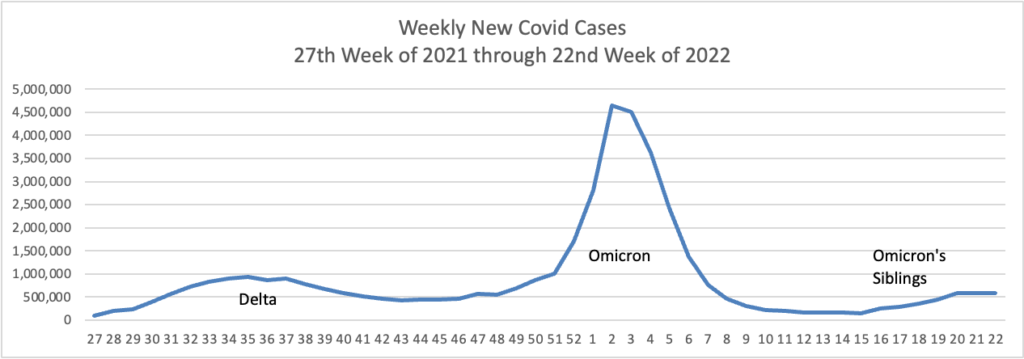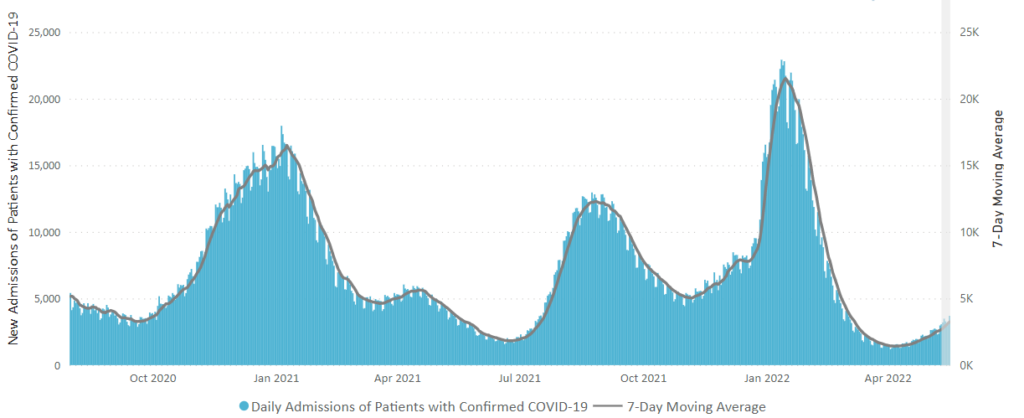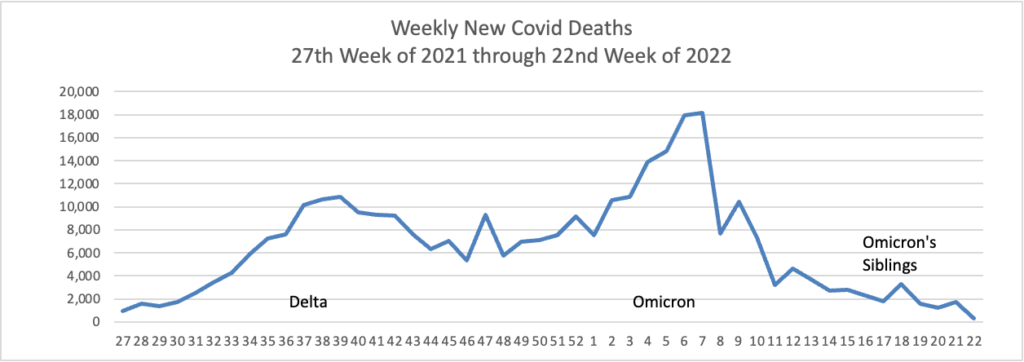Based on the Centers for Disease Control’s Covid Data Tracker and using Thursday as the first day of the month, here is the FEHBlog’s weekly chart of new Covid cases from the 27th week of 2021 through the 22nd week of 2022:

The CDC’s weekly review of its Covid statistics explains “As of June 1, 2022, the current 7-day moving average of daily new cases (100,684) decreased 8.5% compared with the previous 7-day moving average (110,081).”
Here’s the CDC’s current chart of new Covid hospitalizations:

The CDC’s weekly statistical review notes that “The current 7-day daily average [of new Covid hospitalizations] for May 25–31, 2022, was 3,789. This is a 4.7% increase from the prior 7-day average (3,619) from May 18–24, 2022.
Here’s the FEHBlog’s weekly chart of new Covid deaths from the 27th week of 2021 through the 22nd week of 2022:

The CDC’s weekly statistical review adds “The current 7-day moving average of new deaths (244) has decreased 23.1% compared with the previous 7-day moving average (318).”
Here’s the FEHBlog’s weekly chart of Covid vaccinations distributed and administered from the beginning of the vaccination era in December 2020 through the 22nd week of 2022.

According to the CDC’s weekly statistical review,
Overall, about 258.7 million people, about 221.4 million people, or 66.7% of the total U.S. population, have been fully vaccinated.* Of those fully vaccinated, about 103.5 million people have received a booster dose,** but 49.0% of the total booster-eligible population has not yet received a booster dose. As of June 1, 2022, the 7-day average number of administered vaccine doses reported (by date of CDC report) to CDC per day was 343,662, a 9.5% decrease from the previous week.
To wrap up the statistic review, the CDC’s weekly statistical review tells us
As of June 2, 2022, there are 240 (7.45%) counties, districts, or territories with a high COVID-19 Community Level, 733 (22.76%) counties with a medium Community Level, and 2,247 (69.78%) counties with a low Community Level. This represents a slight (−0.53 percentage points) decrease in the number of high-level counties, a small (+1.37 percentage points) increase in the number of medium-level counties, and a corresponding (−0.84 percentage points) decrease in the number of low-level counties. Fifty-one (98.1%) of 52 jurisdictions had high- or medium-level counties this week.
To check your COVID-19 Community Level, visit COVID Data Tracker. To learn which prevention measures are recommended based on your COVID-19 Community Level, visit COVID-19 Community Level and COVID-19 Prevention.
In other Covid news
The Wall Street Journal reports
Novavax Inc.’s vaccine was 90% effective at preventing Covid-19 in its pivotal trial, but the performance came before the emergence of the Omicron variant that has eluded vaccines more than earlier strains, U.S. health regulators said.
The Food and Drug Administration also expressed concern Friday that six people developed heart-inflammation conditions known as myocarditis and pericarditis, out of about 40,000 people who had taken Novavax’s vaccine during various studies.
The agency released its evaluation of Novavax’s Covid-19 vaccine ahead of a meeting of outside advisers who are scheduled to discuss next week whether the agency should recommend authorization of the shot.
The FDA staff’s appraisal suggests the vaccine could face a tough round of questioning from advisers weighing the shot’s uncertain efficacy against Omicron with potential heart risks.
This suggests an unfortunate outcome. The Novovax vaccine was developed using a traditional approach may be acceptable to the vaccine inquisitive.
In healthcare business news
- Health Leaders Media informs us “Health insurers are not holding up their end of the bargain on mutually accepted prior authorization reforms, according to a new physician survey by the AMA.” The FEHBlog is growing concerned that the AMA is winning the prior authorization war.
- Fierce Healthcare tells us “Optum has invested heavily in building out its provider enterprise. But executives at UnitedHealth Group say it’s still early days for the endeavor.”
- Healthcare Dive reports “The Federal Trade Commission is suing to block two separate hospital mergers, the agency said Thursday. The FTC has sued to block HCA Healthcare’s acquisition of Steward Health Care System, alleging that the deal would reduce competition in Utah and ultimately raise prices. In another suit, the FTC is moving to block RWJBarnabas Health from acquiring Saint Peter’s Healthcare in New Jersey, alleging ‘overwhelming evidence’ that the deal would harm patients in the form of less choice and higher prices.”
- The Healthcare Dive article adds
The FTC has now challenged numerous hospital deals this year following its latest action.
Rhode Island’s two largest health systems abandoned plans to merge in February about a week after the FTC sued to block the deal.
New Jersey’s largest health system, Hackensack Meridian Health, lost its appeal challenging the FTC’s move to prevent a tie-up with Englewood Hospital, one of the last independent hospitals in the area.
- Biopharma Dive tells us
Bristol Myers Squibb is buying biotech Turning Point Therapeutics, announcing Friday a $4.1 billion deal that will give the pharmaceutical company an experimental drug that targets mutations found in lung cancer and other solid tumors.
The deal values Turning Point at $76 a share, more than double the $34.16 at which shares closed on Thursday and four times the biotech’s $18 initial public offering price in 2019. Yet the buyout price is well below the company’s peak of $133 a share in February 2021, which gave it a market value of $6.6 billion.
The company’s lead drug, called repotrectinib, has advanced through Phase 2 testing in lung cancer patients whose tumors harbor a mutation called ROS1. Repotrectinib would compete against Roche’s Rozlytrek, if approved. Bristol Myers expects to gain Food and Drug Administration clearance in the second half of 2023.
That’s a lot of money.
From the studies department
Fierce Healthcare points out
As the industry puts a focus on mental health coming out of COVID-19, a new study suggests that loneliness may be a key place to start.
Research from Cigna and Morning Consult finds that more than half (58%) of U.S. adults would be considered lonely. This is on par with pre-pandemic research, which found that 61% of adults are lonely, and made for a seven percentage point increase from 2018.
Loneliness and mental health issues are closely linked, according to the study. Adults with mental health concerns were twice as likely to feel lonely compared to those with strong mental health. The study also found that minorities and younger people were also more likely to be dealing with loneliness.
Three-quarters (75%) of Hispanic adults and 68% of Black adults are classified as lonely, according to the study, figures both substantially higher than the rate of loneliness in the general population. Seventy-nine percent of adults aged 18 to 24 said they feel lonely, compared to 41% of seniors aged 66 and over.
The FEHBlog wishes his readers a weekend full of family and friendship.
